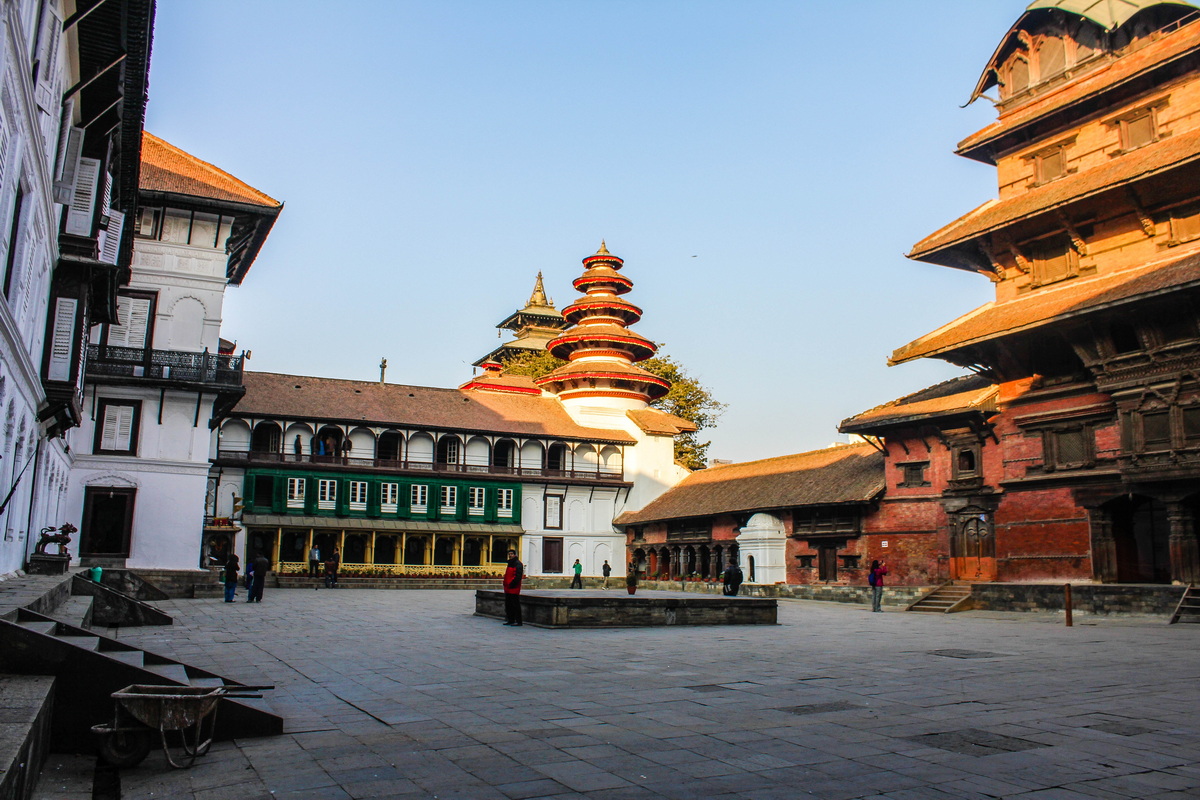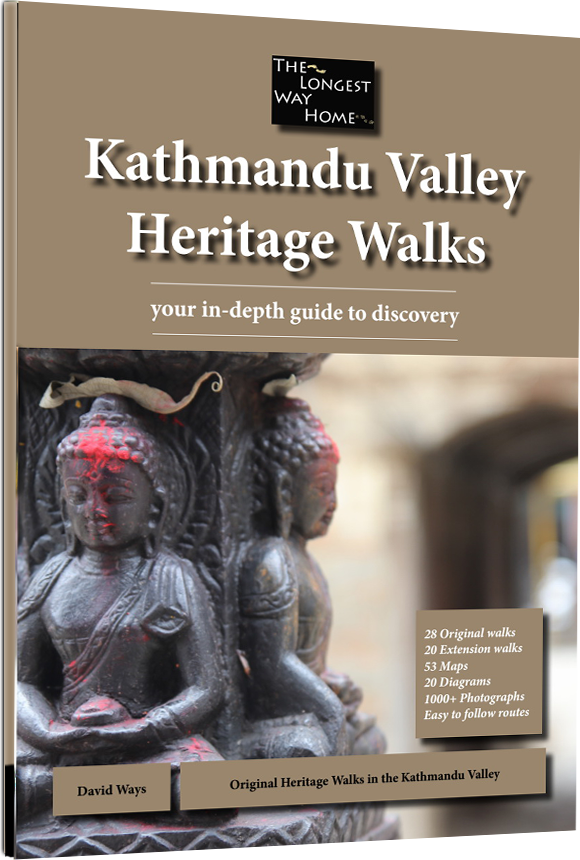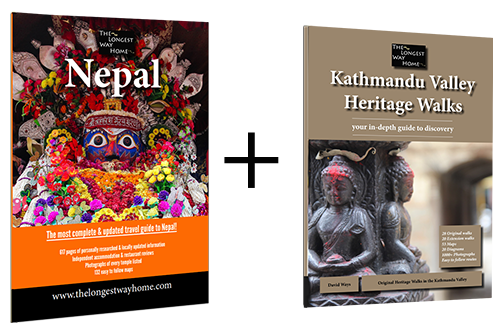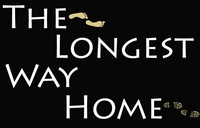

Hanuman Dholka to Swayambu Heritage walk has been around for years despite recent announcements
If there’s one thing the past 10-20 years have failed at in Nepal, it’s documenting ongoing or recent events. As print newspapers moved online we lost an easy way to record events. Print newspapers are filed away in the archives or scanned for digital preservation. Today, online news sites can disappear overnight. Some change link structures and that story from 5 years ago (even 5 weeks ago) disappears with it.
The same is true with travel sites, blogs and so forth. The websites and blogs of 10-15 years ago are all gone now. I’m talking about the ones that used to document their travels rather than the ones today that try to sell affiliate lead products or links. The end result is the vast majority of what we see online these days are people either trying to sell you an affiliate product rather than tell you the truth about a place, or those sites that do simply document things disappear with the information after a few years. Only the likes of archive.org try to keep track of things online, and while good, it does not capture everything.
This is what has happened with the Hanuman Dhoka Heritage to Swayambhu Heritage walk. So much so, that I’m aghast that this fiasco is still going on. So, for the sake of “the record” or documenting this existing heritage walk. Here’s a look at this walk’s past, present and future in a nutshell.
What and where is the Hanuman Dhoka to Swayambhu Heritage walk?
Hanuman Dolka is basically Kathmandu Durbar Square. It’s the inner palace area. The term Hanuman Dolka (Dhoka) is used mainly by locals of that area, rather than Kathmandu Durbar Square which is also known broadly as Basantapur. Yep, confusing. All three names are basically the collective that is best known as Kathmandu Durbar Square.
Also, in the context of this article, we are referring to a specific, “official” heritage walk and not one being sold by a travel or tour company. The latter are plentiful and pretty worthless in terms of value for money or for factual consistency (important when you are telling people about your travels).

Meanwhile, Swayambhu or Swayambhunath Stupa is located about 3km away or 45 minutes walk. It sits atop a hill and is surrounded by temples, monasteries, statues, and the legend of being the first building in Kathmandu. You can read more about Swayambu and why Swayambu is often called Swayambhunath.
The first official heritage walk between the two iconic locations came about post 2015s earthquake. Yet in the subsequent years, more announcements, fundraising, and new openings kept happening – all this for a walk that already existed!
A list of times the Hanuman Dolka to Swayambhu heritage walk has been announced or opened
During this entire period, I was in the middle of my new Kathmandu Valley Heritage Walks guidebook and so the whole topic was something that I was looking at myself. I was creating new original heritage walks not just in Kathmandu city but throughout the Kathmandu Valley. Thusly, linking Swayambhunath was of interest to me. Specifically, because I did not find enough heritage of interest to tourists linking the two sites promptly. To make this clear – there’s plenty of heritage to see, but I wanted my book to give tourists the opportunity to visit something new every few minutes, and not have large 15-minute gaps in between. Nor did I want people traipsing through dump sites, dangerous dog areas, surrounded in traffic, or indeed walk through unsafe areas.
I’m including full external links here, because previous links to other sites have disappeared from Nepali news websites over the years.
2016 – I remember a print and online newspaper article in Kathmandu mentioning UNESCO fundraising for a Hanuman Dolka to Swayambhu heritage walk. In the article, it was mentioned that locals were objecting to being asked to fund it. Considering UNESCOs background, it did not shock me. I felt aggrieved that locals were being told that by financially supporting the walk, they would get money back from tourists visiting the area – something that never seems to happen in Nepal (ask the villagers from the old Annapurna Circuit).

In 2017 – I was mapping out the area for a potential series of heritage walks when I came across local art mentioning the heritage walk along with a plaque commemorating it. This seems to be the UNESCO pledged walk from 2016.
In 2018 – On April 15th the walk was officially announced https://myrepublica.nagariknetwork.com/mycity/news/hanumandhoka-swoyambhu-heritage-walk-from-today. The whole area was full of students engaged in decorating the area. On April 21st this was commemorated by then Nepal Prime Minister Oli. https://myrepublica.nagariknetwork.com/mycity/news/creating-a-cultural-dialogue-through-heritage-walk
So there you have it. The walk was officially made, created and opened. Only it happened again …
2019 – April 18th 2019 the Kathmandu Metropolitan city announced it was planning to reveal the master plan for a heritage walk connecting Hanuman Dolka to Swayambhunath. With again more announcements that the work would bring in money for locals … sound familiar? https://kathmandupost.com/valley/2019/04/17/kathmandu-metropolis-to-open-22km-heritage-route-tomorrow
2022 – the newly appointed Minister for Tourism Jeevan Ram Shrestha confirmed that they would move ahead with the construction of a heritage walk between … you guessed it … Swayambhu and Hanuman Dhoka. Moreover, there would be a budget allocation for it. https://www.tourismmail.com/i-will-build-heritage-walk-route-connecting-swayambhu-and-hanumandhoka-tourism-minister-shrestha This is for the walk that had already been officially opened four years previously by the then prime minister.
This is part of the reason why I’m documenting it here. The 2016-2017 news articles have disappeared into the depths of cyberspace’s broken links aka Nepali new websites being less than good at archiving nor any Nepali print papers having any way to research them, easily.
What is going on?
Who knows?! Most likely someone will babble that somethings have changed, or they will do something a little differently etc. Typical spin. However, at this stage, it’s vitally important to keep a record of just how many of the same Swayambhu to Hanuman Dhoka heritage walks have been created or opened. And keep in mind, the walk was there all along anyway.

Now factor in how many other heritage walks could do with being “official” or have funding given to them or be promoted and you suddenly realise what a waste this has all been. Dozens of heritage walks could be promoted instead of the same one being made over and over again. Adding to this is the fact that the official route of the Swayambhu to Hanuman Dhoka heritage walks is “not that exciting” to tourists.
Is the Hanuman Dholka to Swayambunath Heritage Walk worth it?
Swayambhu to Hanuman Dhoka heritage walk is not that great for tourists in my opinion. It’s not easy to get through with traffic, broken pavements, dogs, rough neighbourhoods, rubbish dumps, and long stretches of seeing nothing. Again, don’t get me wrong. Both Swayambhu and Hanuman Dhoka are great sites in themselves and well worth visiting. And yes, for true archaeologists or heritage lovers, the walk would be interesting. But there are far better ways to do it. I’ve mapped them myself, but, at best, it’s still a dusty walk, with many underwhelming sites along the way (yes there are at least two small interesting temples as well). Rubbish dumping areas, street dogs, traffic and pollution along the way. Not exactly inspiring stuff. I felt it better to tackle each area independently.

This is one reason I simply linked Hanuman Dolka to Swayamnbhu walk in my book Kathmandu Valley Heritage Walks with a map. For actual interesting walks that include the two areas, I offer walks specifically around Swayambhunath which give a lot more value to people with a lot more to see, in a nicer environment. Similarly, Hanuman Dhoka also has its own chapter and I’ve written in countless other walks that link to it that are interesting, avoid traffic, rubbish, dogs (to a point) and touts. In fact, the 28 original walks in my book are the only ones to be linked together and designed so that you’ll see something new every few minutes!
I want people to enjoy heritage walks and see things instead of being led along dusty roads just for the sake of it.
All the same, for the environment I do also include a map on how to walk to Swayambunath so people can get there on two feet rather than a car. If at some stage the “official” Hanuman Dhoka to Swayambunath heritage walks opens whereby it’s actually got more than it currently has on offer, then I’ll certainly consider adding it. But only if it provides a good environment for tourists to walk along it. At the moment, there’s large swaths of open area, traffic, dust, rubbish, and that is not what I think people want.
The importance of documenting things like this
The point of this article is to document the goings-on of this walk. I’m all for new heritage walks. I’ve created 28 original walks and I’d love for more tourists to take an interest in Nepal’s culture compared to trekking. But I’m not interested in the same walk being constantly announced, funded, opened, re-announced, re-fundraised, and re-opened for nearly 10 years. Again, news websites and newspapers keep disappearing, so let’s hope this article serves as a historical marker of sorts. Perhaps in the years to come part of it will make it into a book.

Much like the Digital Archaeology Foundation, or indeed the Kathmandu Valley Heritage Walks book in print, I’ve permanently documented how construction and renovation work has been carried out in Nepal. It will be there for people to pick up in 100 years’ time and say “wow, I never knew this existed, what happened?” Or, “We did a good job preserving these heritage sites”. Meanwhile, people today, can actually do these walks and many more that few others know about.
If nobody documents these things, then we’ll continue to have history repeating itself. Which in the case of the Hanuman Dhoka to Swayambhunath heritage walk seems to have repeated it’s grand opening announcements for long enough.
Moreover, in highlighting this hopefully everyone will discover that there are many more heritage walks to see and enjoy in Kathmandu!
Kathmandu Valley Heritage Walks can be yours to own
This book has been written by a heritage enthusiast, tested by other heritage walkers LIVE on the streets of Kathmandu with the very latest updates and is now available to everyone worldwide.
If you are going to Nepal and enjoy heritage and discovering new places not mentioned anywhere else then this is the best guidebook you can have.

More details on the Kathmandu Valley Heritage Walks guidebook
Or

You can get 50% off my Nepal guidebook by getting it with the Kathmandu Valley Heritage Walk book

I find it insulting that politicians try to get away with this all over the world. As you wrote they capitalize on peoples short attention spans these days and keep rehashing the easy things or completely ignoring facts. Well done for keeping records. I doubt we’ll see another launch of this walk!
It is something many countries are experiencing alright. I dare say too many cooks are in the kitchen with too many hands in the suppliers shops and so on. I’m happy there’s none of that on this website and in my books!
Great information to have. We saw no walk signs last years there and simply made our own way. It seems like some people are just trying to make a profit.
There’s none. I tried to introduce plaques to be placed near heritage zones with a little bit of information. But big business wanted to sponsor it and I thought it was rather tasteless to have a heritage plaque sponsored by “abc” etc. Panauti have done well in this regard. And, it didn’t cost much at all.
Is this more of the UNESCO garbage we see all over the world with more world heritage sites than cities. Not sure what the purpose of UNESCO is these days to be honest. Everything they touch turns into a circus or mess.
Indeed, there are issues when places become designated UNESCO Heritage Zones. Works needs to be done to improve this situation.
We used your books for walks and found to our amazement there was so much to do around Kathmandu. Swayambhu or Swayambhunath (we know the difference!) was a great site. Durbar Square was mess of traffic parking. Much preferred your routes to avoid all the mess.
Yes, there’s lots to do around the Kathmandu Valley. Glad to know you’ve discovered it without all the traffic too!